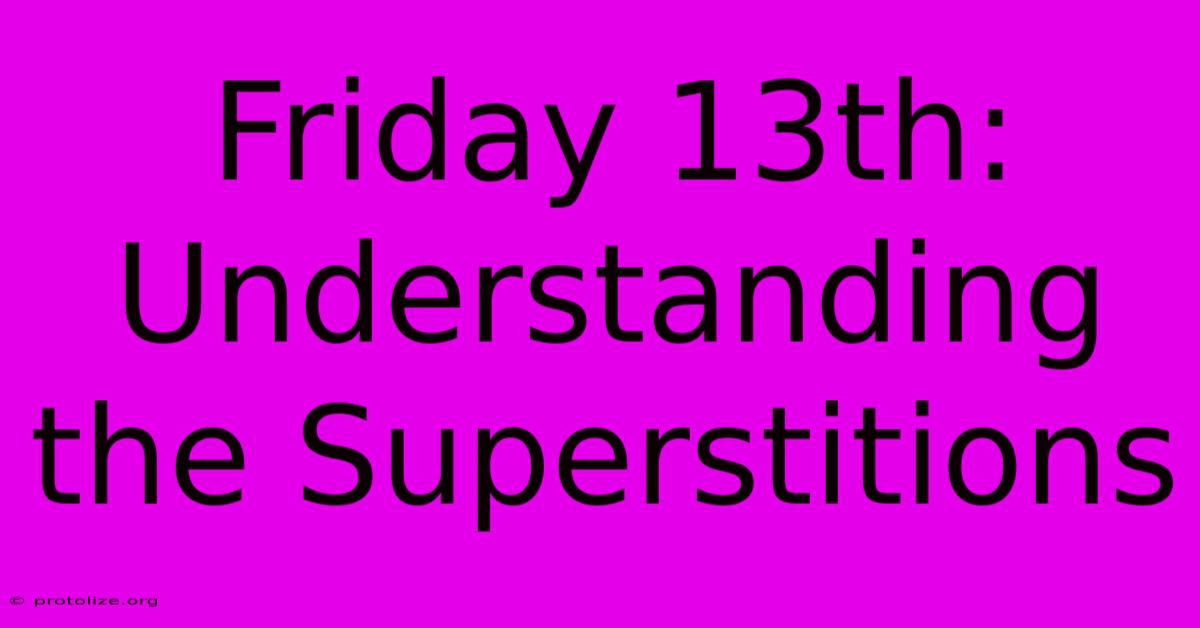Friday 13th: Understanding The Superstitions

Discover more detailed and exciting information on our website. Click the link below to start your adventure: Visit Best Website mr.cleine.com. Don't miss out!
Table of Contents
Friday the 13th: Understanding the Superstitions and History Behind the Unlucky Day
Friday the 13th. The mere mention of the date sends shivers down the spines of many. But where did this superstition originate? And why does the combination of Friday and the number 13 hold such a powerful grip on our collective consciousness? Let's delve into the history and psychology behind this infamous day.
The Roots of the Superstition: A Blend of History and Mythology
The fear of Friday the 13th, known as friggatriskaidekaphobia, is a complex phenomenon with roots stretching back centuries. It's a fascinating blend of historical events, religious beliefs, and cultural interpretations.
Biblical Connections and the Number 13:
Some trace the aversion to the number 13 back to the Last Supper, where 13 people were present before the betrayal and crucifixion of Jesus. This association cemented the number 13's negative connotation in some Christian circles. However, it's crucial to note that this interpretation isn't universally accepted and other cultures held different views on the number 13 long before Christianity.
Norse Mythology and the Thirteen Gods:
In Norse mythology, there's the story of Loki, the trickster god, who crashed a gathering of 12 gods, resulting in the death of Balder, the god of light. This narrative further contributes to the negative perception of the number 13.
Friday's Dark History:
Friday itself carries a long history of negative associations. In Christianity, it's the day of Jesus' crucifixion. This, coupled with the already existing negative perception of the number 13, created a potent combination that fostered the superstition.
The Psychology Behind the Fear:
Beyond the historical context, the fear of Friday the 13th also has a strong psychological component. It plays into our inherent biases and anxieties.
Confirmation Bias:
People tend to remember negative events associated with Friday the 13th more readily than positive ones. This confirmation bias reinforces the superstition. If something bad happens on a Friday the 13th, it's easily attributed to the date, while positive events are often overlooked.
The Power of Suggestion:
Media portrayals frequently link Friday the 13th with misfortune, strengthening the association in our minds. This constant reinforcement, through films, books, and even casual conversations, contributes significantly to the widespread belief.
Anxiety and Phobias:
For some, the fear extends beyond a simple superstition. Friggatriskaidekaphobia can manifest as a genuine anxiety disorder, causing significant stress and impacting daily life. In these cases, professional help may be beneficial.
Friday the 13th in Modern Culture:
Despite its origins in historical events and mythology, Friday the 13th continues to exert a powerful influence on modern culture.
Economic Impact:
Some studies suggest that Friday the 13th negatively impacts business, with people avoiding travel and other activities perceived as risky. This highlights the enduring power of the superstition.
Pop Culture Phenomenon:
Friday the 13th has become a staple in popular culture, appearing in countless films, books, and television shows. This sustained presence further solidifies the date's iconic status.
Overcoming the Superstition:
While acknowledging the historical and psychological reasons behind the fear of Friday the 13th, it's important to remember that it's ultimately a superstition. The day itself holds no inherent power to bring about misfortune.
Tips for managing anxiety around Friday the 13th:
- Acknowledge your feelings: Don't dismiss your anxiety; recognize and validate it.
- Challenge negative thoughts: Actively challenge any negative thoughts or predictions you have.
- Focus on rational thinking: Remind yourself that it's just a superstition.
- Engage in relaxing activities: Practice stress-reducing techniques like meditation or deep breathing.
- Seek professional help: If your anxiety is severe, don't hesitate to seek professional guidance.
Ultimately, Friday the 13th serves as a fascinating case study in how history, mythology, and psychology can intertwine to create enduring cultural beliefs. While the superstition may persist, understanding its roots can help us approach it with a rational perspective and manage any associated anxieties.

Thank you for visiting our website wich cover about Friday 13th: Understanding The Superstitions. We hope the information provided has been useful to you. Feel free to contact us if you have any questions or need further assistance. See you next time and dont miss to bookmark.
Featured Posts
-
Shanahan Campbell Refused To Play
Dec 13, 2024
-
India Faces Vegetable Oil Import Surge
Dec 13, 2024
-
Erp Support Job
Dec 13, 2024
-
Erp Meaning Software
Dec 13, 2024
-
Fired Erin Molan Hostage Fight
Dec 13, 2024
